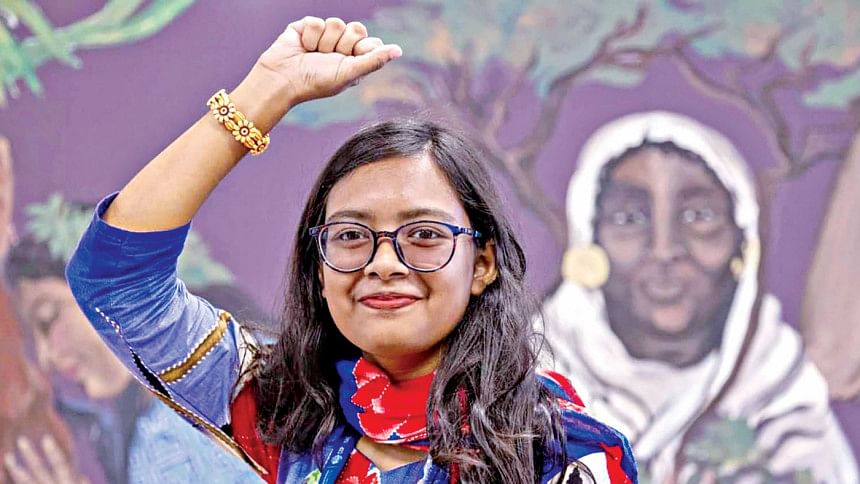A 17-Year-Old’s Fight for Climate Justice at COP28

From the young age of 13, as I stepped into my teenage, my journey as a climate activist unfolded. Four and a half years later, my quest for climate justice, which means justice for my generation, led me to COP28. As a 17-year-old delegate from Bangladesh, I found myself amidst the youngest participants. However, the path was far from straightforward; it was an uphill battle, revealing systemic challenges hindering the active participation of the youngest voices in decision-making.
For a teenager like me from Bangladesh, inclusion at COP28, having a voice on the global stage, and claiming my fundamental right to participate, be heard, and be included in the venue where my present and future were being negotiated, proved to be a challenge larger and more daunting than I could have imagined. Excluded for "lack of experience," facing biases against adolescent competence, and hindered by insufficient funding, young activists like me grappled with systemic challenges at COP28. Despite the responsibility of the older generation to safeguard us, child participation is often perceived as a burden rather than a responsibility using 'safeguarding' as a shield.
To truly achieve climate justice, we must prioritize the 3Ps in our decisions, approaches, and actions: People, Planet, and Participation. Participation, undoubtedly, is fundamental to achieving climate justice and equity while combatting the triple planetary crisis.

Securing a place on the fourth day of COP28, coinciding with the inaugural Health Day, finally opened doors to crucial discussions on climate health, inclusion, and SRHR. From December 3rd to 10th, my engagements spanned open forums, media interviews, climate demonstrations, bilateral talks, and following negotiations.
Throughout this immersive experience, our focus remained unwavering - urging the prioritization of the present and future of today's children and youth. In every interview and speech, I underscored the imperative of placing children's rights at the heart of decisions made at COP28, emphasizing the climate crisis as an injustice to our generation.
Climate activists, including myself, have tirelessly advocated for the operationalization of the loss and damage fund since its announcement in COP27. While our voices were heard on the first day of COP28, pledges must surpass millions and reach into the billions to compensate for the adversities our communities face and they must be kept. Unfortunately, the fund neglects human rights, child rights, and gender-transformative approaches, the very crucial elements. After confronting pressure from civil society for years, the world leaders finally agreed on the need to "transition away from fossil fuels". It is a promising step yet insufficient step toward delivering climate justice and a just transition with a focus on human rights and social equity keeping pace with the short time.
As a teen, I view the climate crisis as an intergenerational challenge. We, the children and youth of today, were born into this crisis and are facing it as a present and future reality. Thus, we must ensure that the principles of inclusivity, intergenerational equity, and participation are followed and emphasized in the decisions made anywhere and everywhere.
Aruba Faruque is a Teenage Climate Justice Activist and Climate Champion at Save the Children in Bangladesh.

 For all latest news, follow The Daily Star's Google News channel.
For all latest news, follow The Daily Star's Google News channel. 



Comments